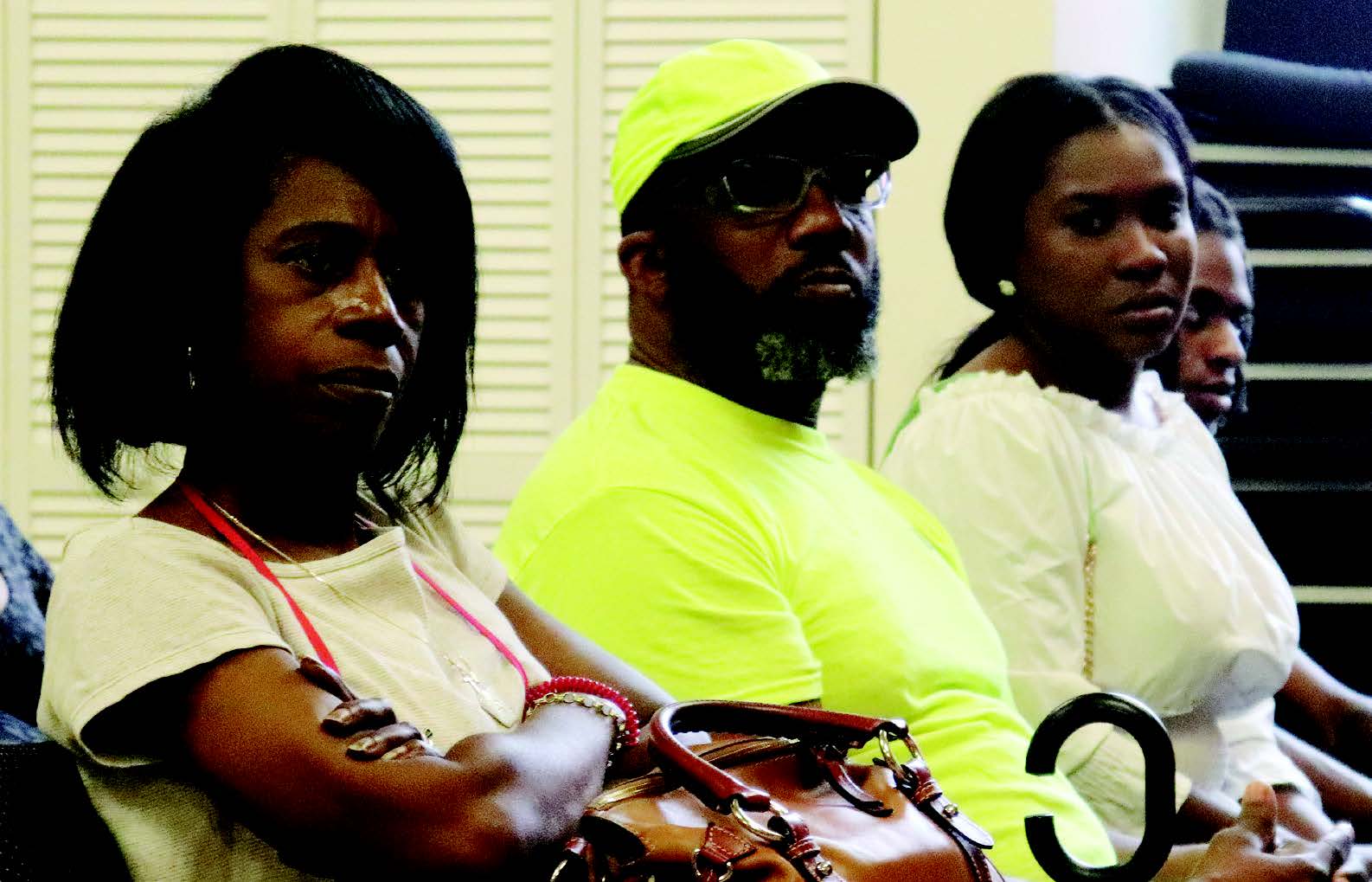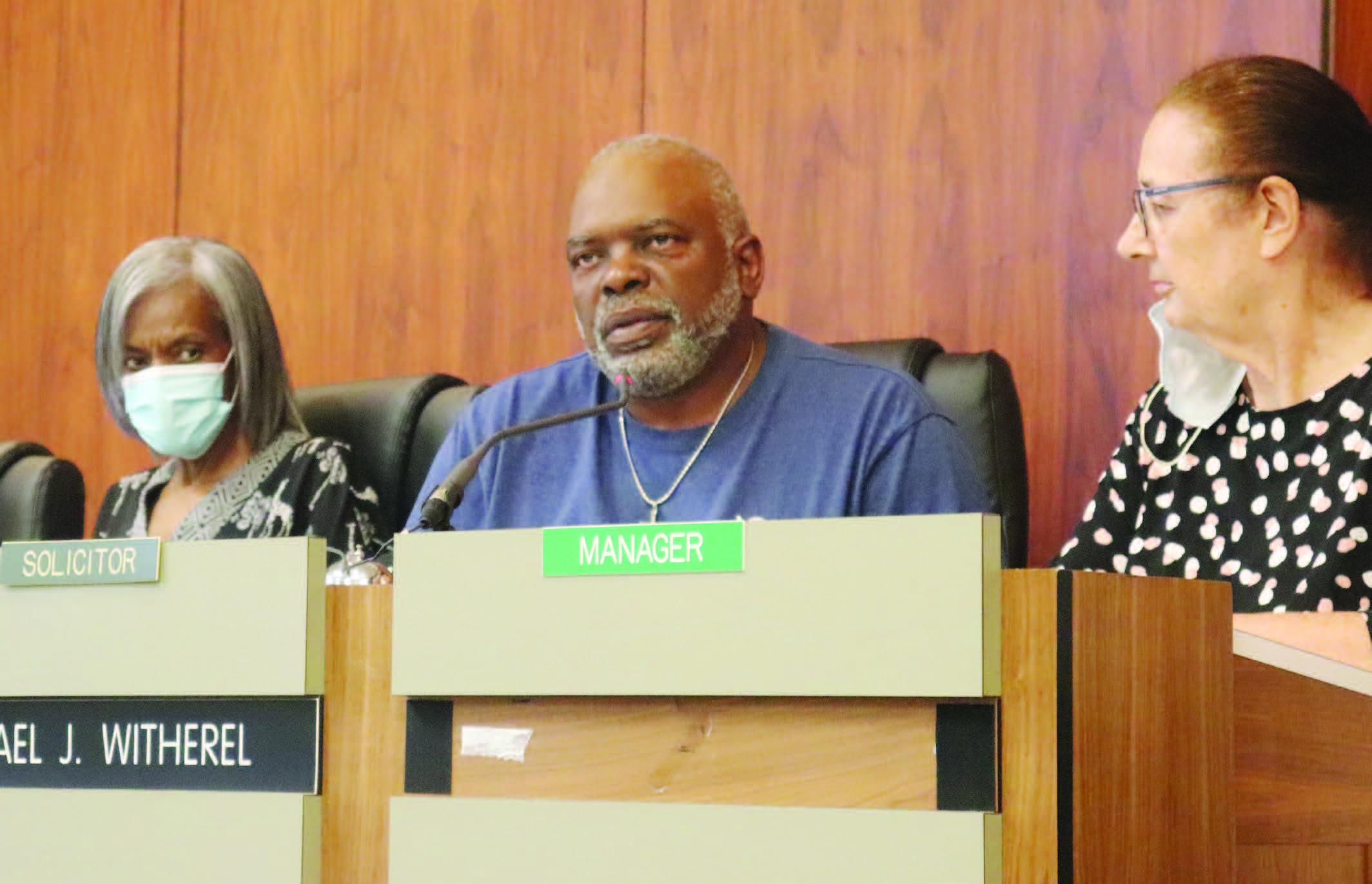Hot-button issue; Borough Council advocating to keep Wilkinsburg’s independence
by Rob Taylor Jr.
Courier Staff Writer
Wilkinsburg students in grades 7-12 attend Westinghouse, inside Pittsburgh city limits in Homewood.
Wilkinsburg residents get their trash picked up by the City of Pittsburgh, and when there’s a fire, the residents are serviced by City of Pittsburgh firefighters.
There’s even a working website, wilkinsburgmerger.org, dedicated to promoting the advantages of Wilkinsburg merging, once and for all, with Pittsburgh.
But on Thursday, July 1, right before the holiday, there was an “explosion” of support from Wilkinsburg officials and residents, saying they don’t want any part of merging with Pittsburgh.

CONCERNED WILKINSBURG RESIDENTS spoke out on July 1 against a proposed merger between Wilkinsburg and Pittsburgh. Pictured in the top photo are Margaret Gramby, Darryl Green and Shonna Green. Pictured in the bottom photo is Derek L. McKinley. (Photos by Rob Taylor Jr.)

“This is a gentrification process that is just going to try to run over Wilkinsburg, try to displace people. We don’t want that here,” voiced Derek McKinley, the union representative for Wilkinsburg’s borough employees, told the New Pittsburgh Courier exclusively. “We want to remain independent. We can handle our own business here. We can take care of our own streets. Not that the city is a bad place, but it’s just not for us.”
Wilkinsburg Council held the engaging press conference at the borough building, flanked by employees, residents and some faith leaders.
The Wilkinsburg Community Development Corporation (WCDC) is the primary entity in the borough that’s been collecting signatures from residents to eventually place the issue on the ballot for a referendum vote for borough residents. The WCDC, which has been in existence since 2008 and has its office just a stone’s throw from the borough building, said Wilkinsburg residents pay more for public safety per resident than Pittsburgh residents, and get fewer resources in return. The organization said that Wilkinsburg has no Citizen Police Review Board, police detective services, year-round youth programs or community task force on police reform, like Pittsburgh does. Yet, Wilkinsburg residents pay $16 more per resident for public safety, according to the WCDC.
The WCDC also said Wilkinsburg’s property taxes are too high, and that a median home value homeowner at Wilkinsburg’s median income level would save $1,593 yearly in property taxes.
But during the July 1 press conference, Denise Edwards, president pro tem of the Wilkinsburg Borough Council, stressed that the WCDC is not part of Wilkinsburg government, though some residents think it is.
“It’s a totally different entity (from Wilkinsburg Council) and they have initiated this drive and it is creating confusion in the community,” Edwards said.
The residents of Wilkinsburg have been through a lot, and rebuilding this community has taken this entire community,” Edwards continued. “We are not looking for any kind of knight to come in here with a magic wand and save us. We are independent, we make our own decisions and we don’t need big banks and big money coming in here and dictating to us how our neighborhoods get rebuilt…I’m very proud of this entire community and I’m very proud to be a Wilkinsburg resident.”
Edwards said that Pittsburgh picking up Wilkinsburg’s trash and providing fire services “are all contracts, just like we sign a contract to do street paving or street reconstruction or any other service.” She said it shouldn’t be construed as the borough wanting to eventually merge with Pittsburgh.

WILLIAM SMITH III, center, said it’s important that Wilkinsburg remain an independent borough because “the Wilkinsburg residents have
a say in how the borough progresses, and they can get things that they really want.” (Photo by Rob Taylor Jr.)
William Smith III, a Wilkinsburg resident who could become an official council member after the November general election, said he’s concerned that Wilkinsburg residents won’t have a political voice if the borough merges with the much-larger Pittsburgh. As it stands now, he said, “the Wilkinsburg residents have a say in how the borough progresses, and they can get things that they really want instead of big corporations dictating to the residents how things will go” to benefit the corporations.
Many Wilkinsburg supporters at the press conference pointed out how 7,000 Black residents left Pittsburgh in recent years, and Wilkinsburg supporters believe it’s all because of how Pittsburgh invites big companies and real estate developers to build apartment buildings, etc., and charge higher rents. That pushes African Americans out the city. Would that happen in Wilkinsburg if it became part of Pittsburgh? The Wilkinsburg supporters don’t want to have to even worry about it. That’s why they’re pushing back on the merger proposal.
“I think the WCDC thinks that because we’re a lower-income borough that poor people are stupid,” said 21-year Wilkinsburg resident Renee Dolney, in an exclusive interview with the Courier. “Let me tell you what poor people understand. They understand power. And they understand graft and greed, and we’re not going to have it. We’re going to fight this.”
Margaret Gramby, who grew up in Homewood and East Liberty, moved to Wilkinsburg more than 13 years ago. She loves Wilkinsburg. She told the Courier she couldn’t understand how the WCDC could be called “Wilkinsburg Community Development Corporation,” while at the same time promoting the idea of the borough losing its independence.
“I’m really confused about that one,” she said.
Gramby added: “I would have stayed in the city if I wanted to continue to live in the city. Wilkinsburg is a diamond in the rough. It can grow so much more than what it is right now.”
Some residents of Wilkinsburg have countered with a website of their own, wilkinsburgfuture.org, to advocate for keeping Wilkinsburg its own entity. The website tells residents how, if the merger happens, their rent could go up due to Pittsburgh’s higher Area Median Income (AMI), 9-1-1 response times could increase, and police officers “who don’t know the neighborhood” would be responding to incidents.
The merger would not affect the current Wilkinsburg school district, which is comprised of Kelly Primary and Turner Intermediate. The partnership between Wilkinsburg and Pittsburgh Public Schools began with the 2016-17 school year, and a new, six-year extension was agreed to in June. While most Wilkinsburg 7-12 students attend Westinghouse, there are about 40 students who attend other magnet schools in the PPS district.
Darryl and Shonna Green are current Wilkinsburg residents who told the Courier they love living in the borough. “I like the closeness, it’s family-oriented, it’s slow-paced for kids,” Darryl said. “I don’t even miss New York City (where he’s from) to be honest with you. I wanted to settle down and this is a great place to settle down,” Darryl said, who also has a son.
Dontae Comans, who won the Democratic nomination for mayor of Wilkinsburg in the May Primary, told the Courier that it’s unfair to Homewood and East Hills residents who continue to seek assistance from Pittsburgh on their neighborhoods, to hear about Wilkinsburg wanting to be “put in the front of the list” to get help from Pittsburgh. “We have to have interest in us,” he said. “We’re not broken. We’re Wilkinsburg. We’re here.”